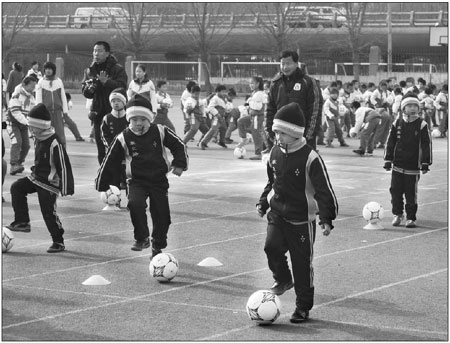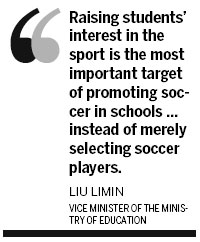|

Students from Dongbeilu Primary School play soccer on the shabby, rubber-made playground on Monday in Dalian, Liaoning province. Officials from the State General Administration of Sport and the Chinese Football Association have promised to build a new synthetic pitch for the school and many more for other schools around the nation in a bid to enhance the sport's development. Lin Jian for China Dailyer |

DALIAN - For years, all the students at the Dongbeilu Primary School wanted was a proper soccer pitch.
The school, which has produced more than 400 players for the domestic leagues and 37 national players, including Dong Fangzhuo, once a Manchester United signing, and Ma Xiaoxu, the former women's national team captain, still suffered from a lack of proper facilities.
However, that is about to change as the Dalian school was promised an artificial turf pitch by the State General Administration of Sport (SGAS) on Monday.
Suffering from a lack of money, the school, which boasted the top level of primary players nationwide, had to train on rubber and even cement fields.
The new pitch is the result of China's recent move to focus on youth soccer and, in particular, school players.
"It's impossible for Chinese soccer to make progress if we don't take action," Liu Peng, director of SGAC, said at a forum about developing the game in schools in Dalian.
Soccer in primary and high schools in China has suffered from a lack of financial support over the years and, according to the Ministry of Education, less than one out of 10 primary and middle schools in China includes soccer development in its budget.
Wang Zuokai, principal of Dongbeilu Primary School, had, over the past three years, repeatedly asked for an artificial turf pitch from the local government to replace the shabby, rubberized ground at the school, but his requests went unheeded.
"As a school, we couldn't afford the money by ourselves, so we just placed another layer of rubber on it (to avoid injuries)," he said.
Besides the inadequacy of its training facilities, the school also had to charge each player 100 yuan ($15) to cover the coaches' salary - 1,000 yuan ($150) a month.
"Most of the coaches are retired players, and they work here just for their love of the sport, not for the money," Wang said.
The 55-year-old school's program now has six boys' teams, one girls' side, a pre-school squad and teaches soccer to all of its students.
However, Wang said his successful program, which boasts 19 national titles, four provincial crowns and 18 regional trophies, had fewer tournaments to play in recent years due to the country's negligence of school soccer.
"There used to be many tournaments for the youngsters," said Wang. "But the authorities stopped the events because they wanted quick success. It's nearly impossible for children to make that sort of step up in their formative days."
The poor development of youth soccer has led to a talent deficit - China has only about 7,000 players under the age of 18 registered at the Chinese Football Association (CFA), compared with Japan's 500,000, according to the CFA.
To increase the country's soccer population, the SGAS, together with the Ministry of Education, has decided to focus on popularizing the sport among school children and will set up schools leagues covering all age groups next year.
CFA chief Wei Di also promised the association would start a special fund from 2011 to ensure at least 100 soccer fields will be built around the country each year.
"Raising students' interest in the sport is the most important target of promoting soccer in schools instead of merely selecting soccer players," said Liu Limin, vice minister of the Ministry of Education.
"Only with a solid foundation can we find more talent and cultivate highly-competent players for our country by further enhancing their skills and knowledge."
Sport minister Liu echoed his point.
"We must make every effort to enhance our reserves of soccer youth talent. It's a long-term mission that we must take on and we shouldn't seek quick success."
Principal Wang praised the government's efforts.
"The authorities are on the right path," said Wang. "Soccer should be a part of daily life and the new policy will offer the children a more systematic and healthy environment in which to grow."
By Tang Zhe